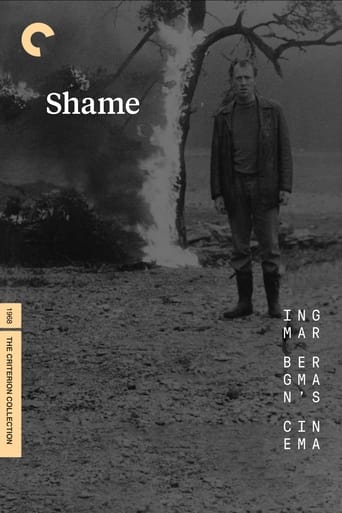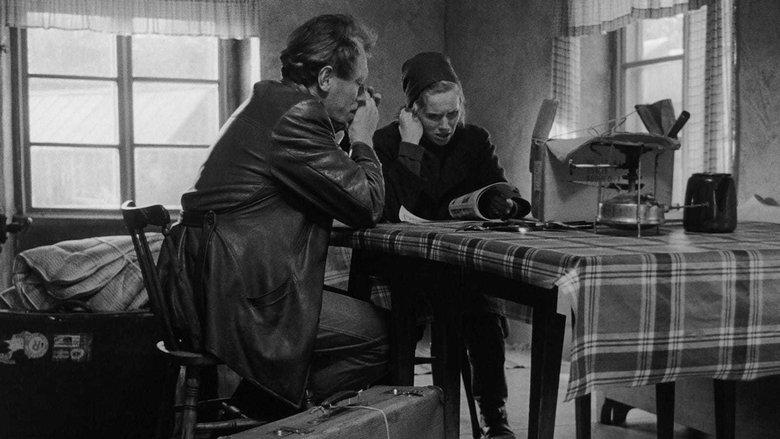Shame (1968)
In the midst of a civil war, former violinists Jan and Eva Rosenberg, who have a tempestuous marriage, run a farm on a rural island. In spite of their best efforts to escape their homeland, the war impinges on every aspect of their lives.
Watch Trailer
Free Trial Channels
Cast


Reviews
Absolutely Fantastic
A Brilliant Conflict
Although it has its amusing moments, in eneral the plot does not convince.
Great movie. Not sure what people expected but I found it highly entertaining.
Ingmar Bergman is really a great director,however wasn't the best one for me, there's fine movies in his career as Jungfrukallan just to quote my favorit a near masterpiece,Skammen has something weird to start,all is based on a fictional civil war which was set place in somewhere at Scandinavia,whereupon there's no civil war at this place in that time which the picture may implied,forgetting all this the picture make sense,a overlooked at point of view over such damages for those people whose most of them don't have no idea why it should be happen,such atrocities,such pain and worst how the persons changes over for instance two leading roles,a anti-war picture but sounds a unreal for to be raised under a virtual war....therefore and just for that 7 out 10!!!Resume: First watch: 2018 / How many: 1 / Source: DVD / Rating: 7.5
Dubbed a masterpiece by almost every critic I respect. I certainly thought was a brilliantly well made film, but one that didn't give me the kind of devastating emotional effect experienced by so many. In fact, going in knowing little about the film, part of what I liked about it would seem like sacrilege to most of those who see the film as completely, unbearably bleak. I may be insane, but I actually found a good portion of it powerfully, blackly funny, in a sort of 'Dr. Strangelove', Roy Andersson sort of way. The surreal insanity of the behavior of the soldiers and officials around our normal working-class couple seemed so exaggerated, almost Keystone Cops with guns, that it DID seem effectively anti-war, but not in the way seen by those who write of unrelieved depression and misery being where the film got its power. That said, it certainly seemed to grow ever more 'real', and by the end felt truly dramatic and haunting. I wonder how I could so misread Bergman's intentions. Certainly, if we're supposed to take the early to middle completely seriously and literally the film works much less well for me than it did, since the horrors these people are exposed to on a literal level seem like nothing compared to the victims of 'real world' wars, where they probably would have been dead very quickly. Take this for what it probably is - an odd outlier opinion, and one that may be replaced when I see the film again. But then, hopefully the occasional outlier can supply a useful alternate point of view.
Extremely pinching vision of a war situation where the couple from Vargtimmen (ok, they have different names and initial situations, but the actors are the same) gets caught in the crossfire of two fronts. The depiction of the fighting parties as faceless, superordinate authorities are often captured in sublime surreal pictures and draws interesting parallels to Orwell's 1984, even if Bergman thwarts this context on a personal level of a slowly burgeoning conjugal war. That is why countless fundamental and philosophical questions towards Eva's and Jan's marriage are relevant and essential, while the threat and danger from the outside tears open an abyss in the inside which was toilsomely covered with lambencies before. An intense allegory on the fragile facades of civic conventions.
What Bergman has got here is "What if all that bad stuff happened here in Sweden, to nice people like us?" And what he gives us, in the Swedish language, with Swedish actors, on Swedish locations (and using what appear to be genuine Swedish military vehicles) is what was familiar from war films set in almost every other country in Europe-- all the confusing invasions and counter-invasions, political lies, internment camps, faked confessions, summary executions, torture, turncoats, "collaborators", and so on. As in a modern short story, it's done in the abstract, with no real names, cities, or countries used. But the stronger faction are "Nazis": they strut about self-importantly, and some wear shiny knee boots. One even whips things with a riding crop (ok, it's actually a cane). The victimized couple are named Rosenberg. Apart from the shame they feel at finding dirtier ways to survive-- and who would not do what they did?-- what all of the above suggests is that the title is clearly meant to refer to Stockholm's de facto complicity with the Nazis. Indeed, what we are shown is what Sweden might have looked like if Germany had asked for a bit more than mining concessions.The first half plays like a black comedy. We see the "fog of war" from the point of view of a comically passive couple who ignore the troops all around, the long convoys, the bombed-out buildings, the news reports, &c. They do not even bother to find a working radio. They are the ultimate in "Not in my backyard". They talk of wine and lingonberries; meanwhile friends are mysteriously conscripted and growing numbers of troops show up in the town. They show no curiosity about the war that has been going on around them for many years.The man (Von Sydow) is cultured, sulky, and a navel-gazer; the woman (Ullman) is somewhat more impulsive, passionate, and outward-looking. There's a beautiful scene in which the man talks about his violin: the manufacturer, he says offhandedly, fought in the Napoleonic wars, but his own interest stops with the cultural artifact in his hand-- or, more precisely, which his own warm feelings about owning it, and the security that that ownership assumes. Not in my backyard! But when war finally breaks into their bucolic idyll, the man's timidity, an irritation in good times, turns into a liability, one he ends up overcompensating for-- as is often the case-- as Bergman demonstrates subtly and beautifully. Definitely worth seeing.








